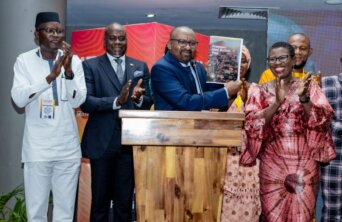- About
- Topics
- Picks
- Audio
- Story
- In-Depth
- Opinion
- News
- Donate
- Signup for our newsletterOur Editors' Best Picks.Send
Read, Debate: Engage.
| topic: | Climate Change |
|---|---|
| located: | Sierra Leone |
| editor: | Nour Ghantous |
On 6 February, 2025, Freetown hosted the African Urban Heat Summit, a historic gathering aimed at addressing the escalating climate crisis in rapidly growing African cities. Led by the Freetown City Council (FCC) and Climate Resilience for All (CRA), the summit marked a significant turning point in the region’s climate adaptation efforts, with the unveiling of Freetown’s first-ever Heat Action Plan (HAP) - a blueprint to mitigate extreme heat and safeguard the city’s most vulnerable populations.
While the dangers of climate change have long been acknowledged, extreme heat remains an overlooked and underestimated threat. As the FCC Chief Administrator noted at the event, “crippling heat is everywhere, but it doesn’t affect everyone equally.” The urban poor, pregnant women and people with disabilities bear the brunt of rising temperatures, facing greater health risks and fewer resources to adapt.
The HAP seeks to change that narrative, integrating infrastructure solutions, public awareness campaigns and nature-based interventions to protect at-risk communities.
Beyond being a policy milestone, the summit symbolised a shift in mindset, moving beyond crisis response to proactive governance. At the event, Amjad Abbashar of UNDRR emphasised, “Heat is not just an environmental problem; it is a governance challenge.”
Embedding heat action plans within broader disaster reduction and urban development strategies will be key to ensuring long-term resilience.
But Freetown’s heat plan is not just a local effort—it is part of a larger movement to position West African cities at the forefront of climate action. Mayors from Monrovia, Conakry, Accra and other regional capitals attended the summit, underscoring a growing recognition that African cities must lead in urban innovation.
The World Bank’s Abdu Muwonge highlighted successful urban resilience strategies in Kigali, Johannesburg and Nairobi, advocating for better urban planning and the protection of critical ecosystems like mangroves and wetlands.
Despite these promising initiatives, scaling up solutions remains a challenge. Cassie Sutherland of climate leadership group C40 noted that the number of cities exposed to extreme heat is expected to triple in the next three decades, with economic losses projected to reach $2 trillion by 2030. However, she emphasised that solutions already exist - it is now a matter of scaling them rapidly.
One of the most compelling aspects of the summit was the strong global commitment to supporting Freetown’s efforts. The British High Commissioner, Josephine Gauld, called for greater investment in green infrastructure, while the EU Chargé d’Affaires, Gerald Hatler, reaffirmed European backing for urban climate resilience in Sierra Leone. The UK’s Special Representative for Climate Rachel Kyte went further, stating, “Extreme heat is terrifying, and we are unprepared,” urging international collaboration to support cities on the frontlines of climate change.
Perhaps the most powerful takeaway from the summit was the spirit of collective action. Freetown Mayor Yvonne Aki-Sawyerr emphasised that real change requires community participation: “As Margaret Mead once said, ‘Never doubt that a small group of thoughtful, committed citizens can change the world.’”
This summit was not just about recognising the threat of extreme heat - it was about championing sustainable, scalable solutions. Freetown’s Heat Action Plan sets a precedent for other African cities, proving that urban resilience is not just possible, but necessary.
With continued commitment from local and international partners, this moment could be the start of a new chapter in West Africa’s fight against climate change.
